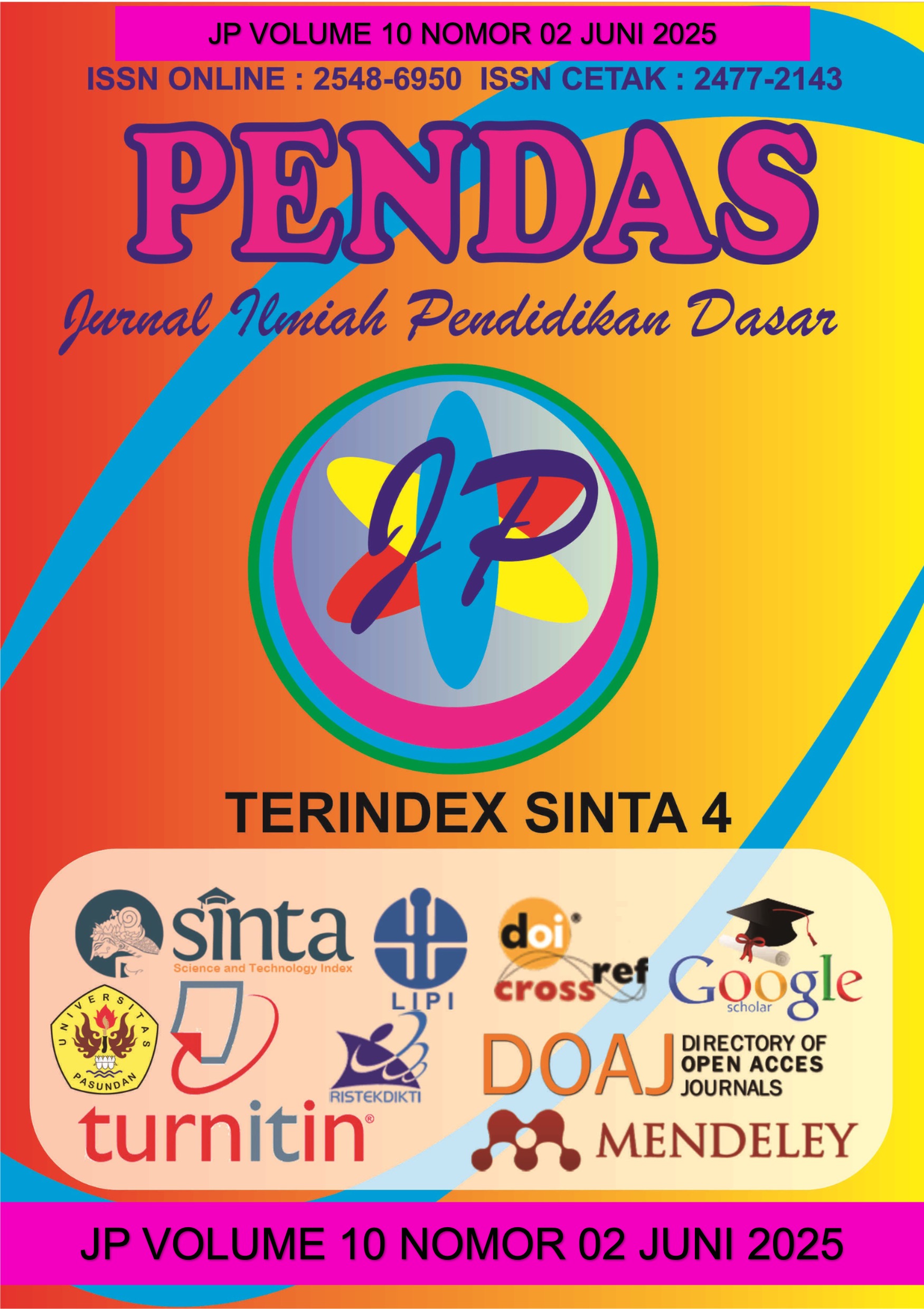PENGARUH PENGGUNAAN MEDIA “GOOGLE EARTH” BERBASIS MODEL PEMBELAJARAN PROBLEM BASED LEARNING UNTUK MENINGKATKAN BERPIKIR SPASIAL SISWA PADA MATA PELAJARAN GEOGRAFI DI SMA N 5 BUKITTINGGI
DOI:
https://doi.org/10.23969/jp.v10i02.23918Keywords:
Learning Media, Google Earth, Spatial Thinking AbilityAbstract
This study aims to determine the effect of google earth learning media on the spatial thinking ability of SMAN 5 Bukittinggi students. The research method used in this research is experimental method. Sampling was done by purposive sampling technique. The samples in this study were XI F7 students as the experimental class given the treatment of google earth application learning media and XI F6 class as the control class given the treatment of learning media in the form of maps. Data collection using pretest and posttest instruments in the form of multiple choice that has been tested for validity and reliability, as well as observation. The results of this study are the influence of google earth learning media on the spatial thinking ability of students in class XI F7 SMAN 5 Bukittinggi. The average posttest of the experimental class was 85.64 and the control class was 74.08. Data analysis using the Paired Sample T-test test from the calculated data obtained a significance level (Sig.) of 0.001 because the significance is smaller than 0.005 (0.001 <0.005), then Ho is rejected and Ha is accepted.
Downloads
References
Aliman, M. (2020). Pengembangan Instrumen Tes Kemampuan Berpikir Spasial Bagi Siswa SMA. Geodika: Jurnal Kajian Ilmu Dan Pendidikan Geografi, 4(1), 1–10. https://doi.org/10.29408/geodika.v4i1.1823
Ardiati, S., Hartinah, S., Tegal, U. P., Satelit, G. M., & Belajar, M. (n.d.). Aplikasi Google Maps untuk Meningkatkan Motivasi Peserta Didik Pada Pelajaran Geografi SMA. 5(3), 4137–4144.
Ariani, T. N., Chairunisa, E. D., & Suryani, I. (2020). Penerapan Media Pembelajaran Menggunakan Google Earth Dalam Materi Kondisi Masyarakat Indonesia Pada Masa Penjajahan Terhadap Hasil Belajar Siswa Pada Mata Pelajaran Ips Terpadu Di Smp Quraniah Palembang. Kalpataru: Jurnal Sejarah Dan Pembelajaran Sejarah, 6(2), 96–101. https://doi.org/10.31851/kalpataru.v6i2.5253
Arif, M. S. (2022). Analisis Perbedaan Tingkat Operating Leverage Financial, dan Total Leverage di Masa Sebelum dan Selama Pandemi COVID-19 pada Perusahaan Manufaktur yang Terdaftar di BEI tahun 2018-2021. 29–42. https://repository.stiedewantara.ac.id/3627/
Arifin, M. (2014). Instrumen Penelitian Kualitatif, Kuantitatif, Dan Pengembangan. Implementation Science, 39(1), 1.
Handayani, A., & Koeswanti, H. D. (2021). Meta-Analisis Model Pembelajaran Problem Based Learning (PBL) Untuk Meningkatkan Kemampuan Berpikir Kreatif. Jurnal Basicedu, 5(3), 1349–1355. https://doi.org/10.31004/basicedu.v5i3.924
Hidayat, M. (2022). IMPROVING STUDENTS ’ SPATIAL THINKING ABILITY BY APPLYING THE " BLENDED LEARNING-RIGOROUS MATHEMATICAL THINKING ".
Medani, Z. P., Suharto, Y., Taryana, D., & Sumarmi, S. (2022). Pengaruh model guided discovery learning berbantuan google my maps terhadap kemampuan berpikir spasial siswa SMAN 1 Singosari. Jurnal Integrasi Dan Harmoni Inovatif Ilmu-Ilmu Sosial (JIHI3S), 2(6), 534–547. https://doi.org/10.17977/um063v2i6p534-547
Metakognitif, R., Pendidikan, S., Ariffin, M., Bakar, A., Pendidikan, S., & Ismail, N. (2020). Machine Translated by Google Jurnal Pembelajaran Internasional e- ISSN : 1308-1470 • www.e-iji.net Machine Translated by Google. 13(3), 633–648.
Muslimin, U. (2021). Pengaruh Retailing Mix Terhadap Keputusan Pembelian. Amsir Management Journal, 1(2), 81–92. https://doi.org/10.56341/amj.v1i2.22
Mustaqim, R. A. (2021). Penggunaan Google Earth Sebagai Calibrator Arah Kiblat. Jurnal Justisia : Jurnal Ilmu Hukum, Perundang-Undangan Dan Pranata Sosial, 6(2), 194. https://doi.org/10.22373/justisia.v6i2.11537
Mutia, T., Rosyida, F., Alfyananda, P. K., Alfi, S., & Wulan, P. S. (2023). Media Google Earth Dengan Problem Based Learning Berpengaruh Terhadap Kemampuan Bepikir Spasial Siswa Sma. GEOGRAPHY : Jurnal Kajian, Penelitian Dan Pengembangan Pendidikan, 11(2), 303. https://doi.org/10.31764/geography.v11i2.16943
Oktavianto, D. A. (2017). Pengaruh Pembelajaran Berbasis Proyek Berbantuan Google Earth Terhadap Keterampilan Berpikir Spasial. Jurnal Teknodik, 1, 059. https://doi.org/10.32550/teknodik.v21i1.227
Safina, L., & Suasti, Y. (2023). Development of Learning Media using Google Maps Application and Here Wego Application to Improve Spatial Thinking Ability in Students at SHS 6 Pinggir. 3(2), 114–120.
Sanaky, M. M. (2021). Analisis Faktor-Faktor Keterlambatan Pada Proyek Pembangunan Gedung Asrama Man 1 Tulehu Maluku Tengah. Jurnal Simetrik, 11(1), 432–439. https://doi.org/10.31959/js.v11i1.615
Santoso, A. (2022). Pengaruh Media Pembelajaran Google Earth Terhadap Kemampuan Berpikir Spasial Siswa SMA. Geodika: Jurnal Kajian Ilmu Dan Pendidikan Geografi, 6(2), 152–162. https://doi.org/10.29408/geodika.v6i2.5998
Sari, Y. I., Sumarmi, Utomo, D. H., & Astina, I. K. (2021). The Effect of Problem Based Learning on Problem Solving and Scientific Writing Skills. International Journal of Instruction, 14(2), 11–26. https://doi.org/10.29333/iji.2021.1422a
Sistem, P., Geografis, I., Dalam, S. I. G., & Setiawan, I. (n.d.). ( SPATIAL THINKING ). 83–89.
Wood, D. F. (2003). Problem based learning What is problem based learning ? 326(February).
Downloads
Published
Issue
Section
License
Copyright (c) 2025 Pendas : Jurnal Ilmiah Pendidikan Dasar

This work is licensed under a Creative Commons Attribution 4.0 International License.














































